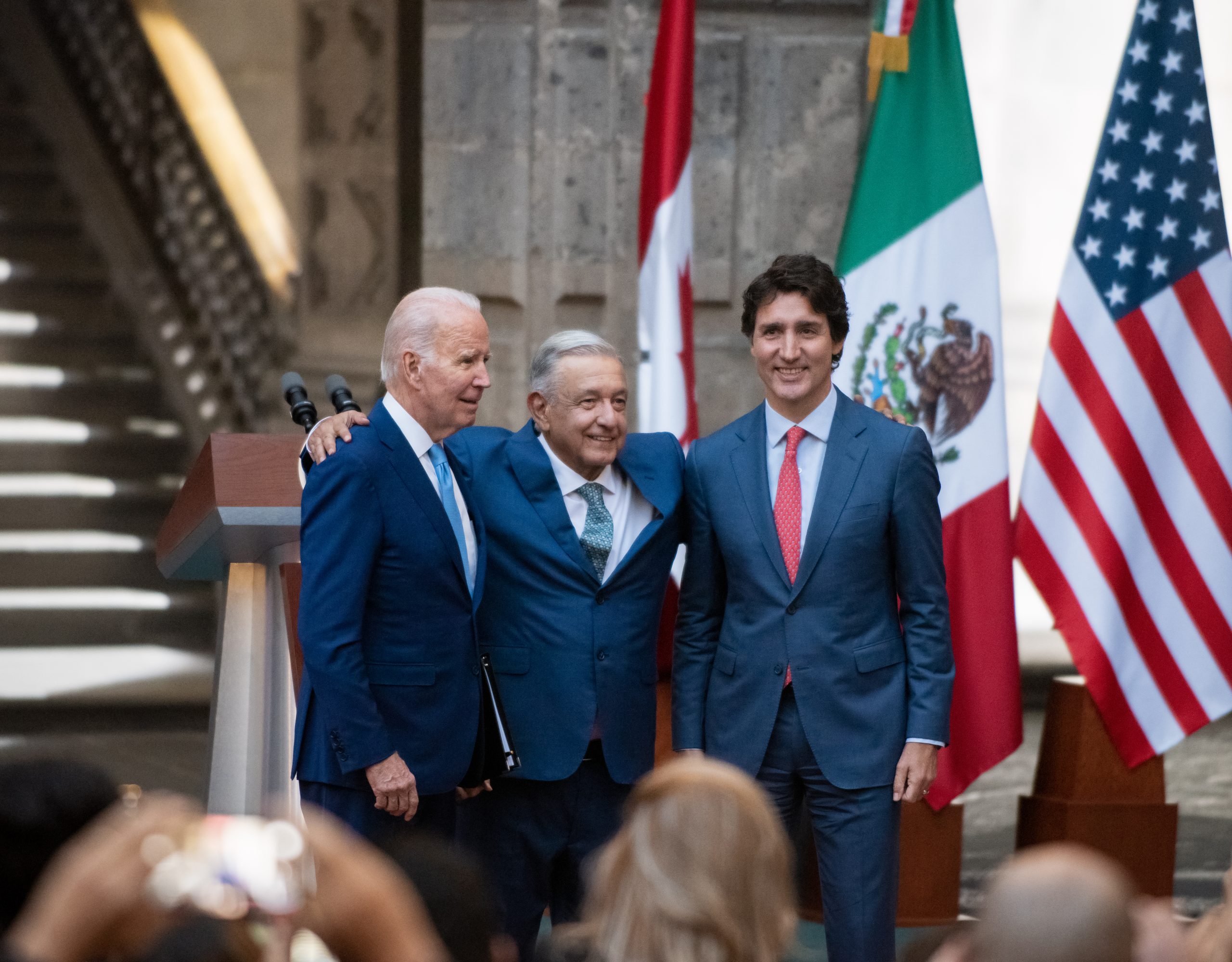
FILE: López Obrador with U.S. President Joe Biden and Canadian Prime Minister Justin Trudeau at the North American Leaders’ Summit in January 2023. (Photo By EneasMx/Wikimedia Commons, CC BY-SA 4.0)
By Blayne Haggart, Brock University, The Conversation
There is a ticking time bomb at the heart of the North American economy. And this is the year that it begins to detonate.
Over the past several months, Canadian businesses and analysts have been pressuring the federal government to better prepare for the mandated renegotiation of the Canada-United States-Mexico Agreement (CUSMA) that regulates trade and economic activity among the three North American countries.
Article 34.7 of the pact effectively commits the three countries to undertake a review of the new agreement every six years, in 2026 (the agreement went into force in 2020).
This might not seem like a big deal. Canada has negotiated many trade agreements, and a regular review of our most important trade agreement may seem reasonable.
But CUSMA is no regular trade agreement, in large part because this highly unusual review process undermines the very security and stability that trade agreements are supposed to provide.
Eviscerating Canadian policy autonomy
In 2018, in the depths of the first Donald Trump presidency, Canada, the U.S. and Mexico renegotiated the North American Free Trade Agreement (NAFTA) that had governed continental economic relations since 1994.
The agreement — called the United States Mexico Canada Agreement (USMCA) in the U.S., the Tratado entre México, Estados Unidos y Canadá (T-MEC) in Mexico and CUSMA in Canada — was largely greeted with relief throughout Canada.
Negotiated under duress with a Trump administration that was threatening to tear up NAFTA, the three governments seemingly preserved a rules-based approach to managing economic relations with our most important trading partner. Free trade had been saved.
But there was a twist due to the deal’s requirement that the three countries review the pact every six years.
Trade agreements are bigger than their specific rules. Their real importance lies in how they provide the smaller partners with certainty and protection from the coercive power of the larger partners.
The promise of greater market access, and the threat of restricting this access, has always been the American trump card in its international economic relations. American negotiators use this threat/promise to convince partners to adopt, change or eliminate policies in the U.S. interest.
But once an agreement is signed, the U.S. loses this leverage — which is good for smaller countries’ policy autonomy.
American interests
As I detail in my 2014 book Copyfight: The Global Politics of Digital Copyright Reform, Canada demonstrated significant policy autonomy in its 2000s-era copyright reforms. In contrast, Mexico’s 1990s-era digital copyright reforms related to software reflected American interests.
The difference? Canada’s negotiations took place after NAFTA had been negotiated, while Mexico’s reforms were the result of the NAFTA negotiations, when the U.S. was using market access as a negotiating tactic.
Having a trade agreement with a renegotiation clause is like having no agreement at all because everyone knows that, once renegotiations start, everything is back on the table.
As I argued in two 2018 articles for The Conversation Canada, the renegotiation requirement significantly reduces smaller countries’ overall policy autonomy. Knowing that renegotiation is on the horizon will mean that the threat of economic blackmail will hang over all policies as they become pawns to be sacrificed to preserve the Holy Grail: access to the U.S. market.
‘Regulatory chill’
Knowing that any policy could be effectively targeted by the U.S. means that Canada and Mexico run the risk of widespread regulatory chill: governments, anticipating retaliation, become excessively cautious in their regulatory efforts.
These chilling effects can already be seen, two years away from the start of formal renegotiations. In early September, the Business Council of Canada called on the federal government to revoke its new three per cent digital services tax on foreign tech giants for fear it might “imperil” the upcoming talks.
The implications of the CUSMA time bomb are beginning to be understood in Canada.
In a recent editorial, The Globe and Mail argued that Canada should make some enormous policy concessions — eliminate the new digital services tax, end the agriculture supply management system and crack down on forced labour in supply chains — in exchange for eliminating regular CUSMA reviews.
The myth of free trade
Editorialists are labouring under the belief that free trade is still in play. It’s not.
Ideologically, the U.S. is no longer the free-trade champion it was.
More pragmatically, any concessions are highly unlikely to convince the U.S. — regardless of which party is in power — to surrender the most potent weapon it has in its arsenal to pressure its neighbours to adopt its preferred policies. Policy reform, simply put, leads to U.S. market access.
While the U.S., Canada and Mexico will continue to sign trade and economic agreements, these deals are no longer reliable tools to deliver the certainty and protection enjoyed under NAFTA for three decades prior to 2018. Renegotiated deals will merely restructure Canada’s continental relationship, they won’t preserve Canadian autonomy.
The 2018 CUSMA didn’t preserve free trade in North America. It signalled its demise and the return of power politics to our most important economic relationship.![]()
Blayne Haggart, Associate Professor of Political Science, Brock University
This article is republished from The Conversation under a Creative Commons license. Read the original article.





















